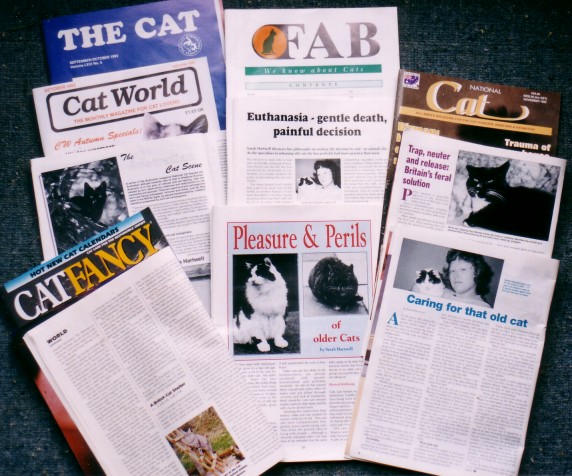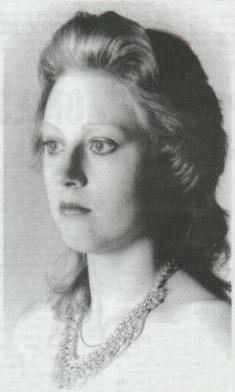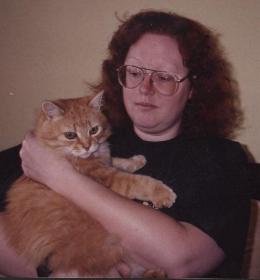
ABOUT MESSYBEAST CATS
About Sarah Hartwell

Strangely enough, I didn't grow up with cats as my mother disliked some aspects of feline behaviour. Cats came into my life in my early twenties after I had left home and needed some non-human company. I grew up in a fairly rural village during the 1970s and I'd grown up loving animals, nature and science books.
My best academic subjects had always been biology and genetics. I started studying genetics when I was 12 or 13 and have continued study the subject ever since - that's over 40 years of genetics study, 35 years of which centred on cat genetics. I started off working in hospital laboratories and despite an aptitude for medical sciences, I opted for a career in the better-paid fields software engineering, got a BSc (Hons) in that field, and then moved into quality assurance (which had the added benefit of not involving animal experimentation). Although I worked in engineering, I continued studying biology, genetics and cat behaviouras a hobby. I corresponded with behaviourists and geneticists and went to veterinary and behavioural lectures and conferences where my early medical background provided an understanding of the jargon. Had the fields of domestic animal genetics or pet behavioural studies existed when I was at school, my career path would have been much easier.
Until my day job became too demanding, I volunteered my spare time at a cat rescue shelter where I got plenty of hands-on experience of cat rescue. I used the experience to write cat care/welfare articles for magazines around the world. I also wrote two new leaflets for Cats Protection (League), one on older cats and the other on euthanasia/pet bereavement and contributed information or consultancy effort to several books about cats. My working notes became the basis of the original articles on the Messybeast Cats website. Because I understood the terminology in scientific articles, I decided to make the information accessible to people who didn't have a scientific background. In the days when most cat-care information was still on paper, I wanted to provide a convenient online resource for owners of old or disabled cats and I wanted to make it freely available to the smaller, independent cat rescue groups.
Through cat rescue work I met and learned from rescuers, feral cat workers, owners, behaviourists, vets and breeders. The downside was encountering neglect, cruelty and cat hoarding. I learnt how to improvise cat rescue in different situations. I visited animal shelters/clinics while abroad to find out about animal welfare/rescue in different cultures and how local problems were tackled. While my degree may be in software, I've spent 35 years at the "University of Life" studying aspects of cat care, welfare, behaviour and, of course, inheritance genetics. As a result of all this spare time study and hands-on experience, I've been invited to contribute to books on cat behaviour, care of older or disabled cats, feral cats, cat breeds, cat genetics and various related topics. A lifetime of passionate study is often the equal of a degree course.
Another of my passions was history and old books, thanks to my father's collections of children's encyclopedias. This got me researching and publishing the early history of cat breeds and cat shows, adding my own commentaries based on modern-day knowledge and my magpie-like tendency to collect snippets of useful information from just about anywhere. I've been working with other cat historians to get a lot of lost knowledge online in the form of historical magazines and books. I have also translated several early cat books from French and German, providing the first ever English language versions of those books and making them available to other cat historians.
Over the years, I've adopted hard-to-home cats - older cats, disabled cats, bad-tempered cats or those which were always passed over as being "unattractive". Hands-on experiences with these cats formed the basis of many of my cat care/welfare articles.

If you hadn't guessed, I am English. Messybeast articles have been translated from English into a growing number of other languages. In addition to my own works and co-authored works, I've converted a number of out-of-copyright cat books to text format so that the content can be used by others. I've also worked with native speakers of other languages to translate historical foreign cat articles into English for the first time. My other hobbies are widely eclectic.
Messybeast Cats
 The articles on Messybeast are drawn from a combination of my own personal experiences, research in scientific and medical journals plus information and images contributed by correspondents. It is challenging and fascinating to combine facts and information from all of these different sources and draw useful conclusions - I think of it as being like putting together a jigsaw. As well as making useful information available on one website, I try to present complex or scientific topics in plain English, making the information available to a wider audience.
The articles on Messybeast are drawn from a combination of my own personal experiences, research in scientific and medical journals plus information and images contributed by correspondents. It is challenging and fascinating to combine facts and information from all of these different sources and draw useful conclusions - I think of it as being like putting together a jigsaw. As well as making useful information available on one website, I try to present complex or scientific topics in plain English, making the information available to a wider audience.
Messybeast is not affiliated with any individual cat registry or organisation and most of the information is not specific to any single country or organisation. Country-specific articles have titles indicting what region they apply to. Readers must bear this in mind, especially regarding different cat breeds and different styles of cat care: what is acceptable/valid in one country may be regarded as unacceptable/invalid (or as deformed or cruelty) in another; what is encouraged or tolerated by one registry may be banned outright by another.
While information in Messybeast Cats is researched and provided on an impartial basis, I reserve my right to express personal opinions; where I express an opinion it is marked as such to distinguish it from factual content.
Cat work also has its funnier side and those experiences are at Moggycat along with inspirational poetry and prose.